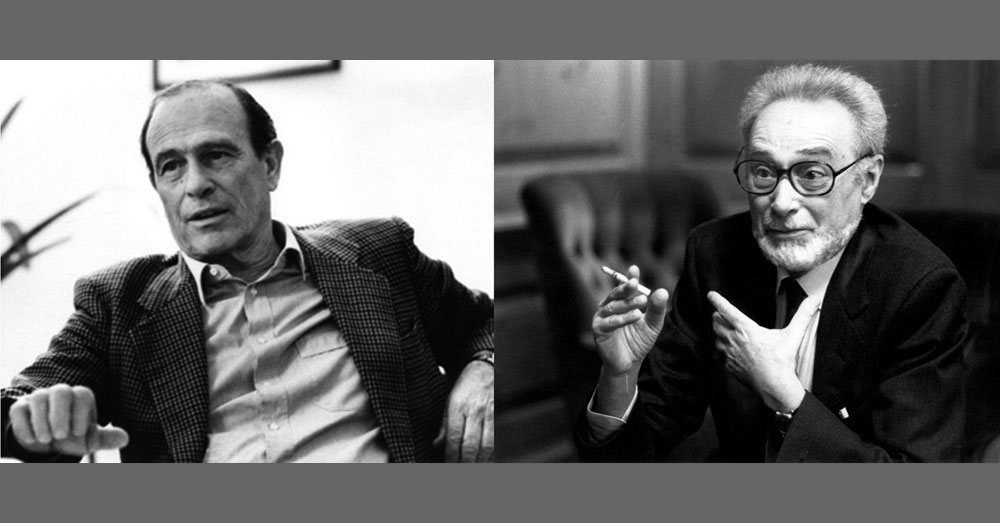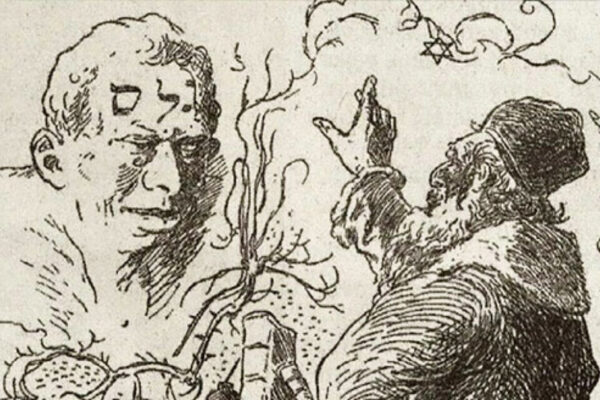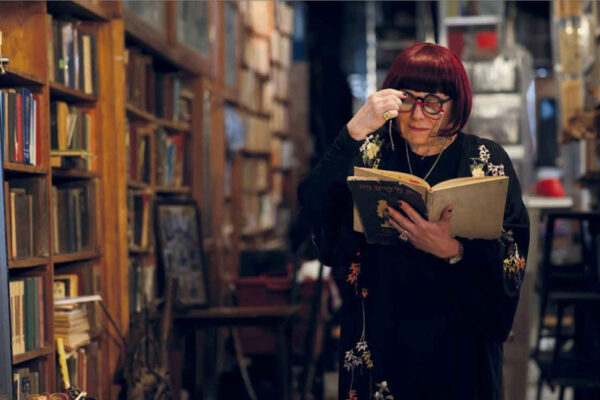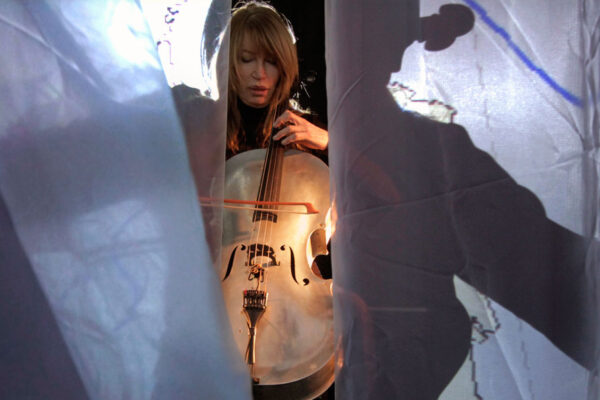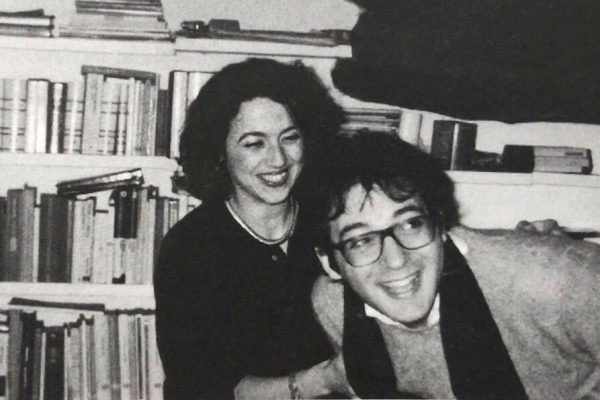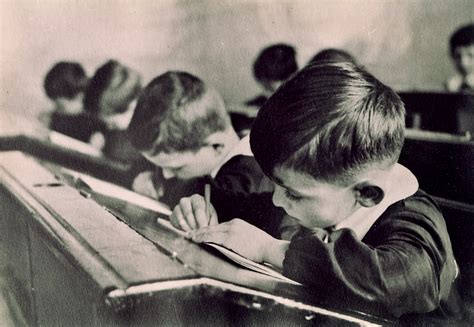Giorgio Bocca interviews Primo Levi (1985)
Post-war Italian and European societies largely identified anti-Fascism as their foundation. Today, across Europe this assumption is being challenged. In an the attempt to understand what anti -Fascism means today, we came across a TV Interview that Giorgio Bocca conducted with Primo Levi in 1985, which testifies to the depth and foresight of Levi’s reflections on history.
The interview appeared recently in the online magazine Doppiozero introduced by Marco Belpoliti.
Translated by Paul M.Rosenberg for Printed Matter. Courtesy Doppiozzero.
In 1985 Giorgio Bocca hosted a broadcast on Channel 5 called “Prima Pagina”. Later he would occasionally talk about this collaboration with Berlusconi’s TV. He interviewed a variety of personalities, and in June of that year he met with Primo Levi.
The occasion was the publication of a new book by the writer from Torino: Other People’s Trades; a book of essays, or rather short articles which had appeared in various newspapers with which Levi had collaborated, primarily “La Stampa”; earlier, in the 1960s, his work had also appeared in “Il Giorno,” a paper to which Bocca was also one of the contributors.
This was a coincidence, like the other coincidence which probably moved Bocca to interview Levi: together they had been part of the armed resistance in WWII as members of the partisan group Giustizia e Libertà. Levi fought for only a short time, as part of a shabby band of partisans that was reported by a spy.
Furthermore they are both from the Piedmont: Bocca from Cuneo, Levi from Torino. The city of the Mole can be felt in the background of this conversation in the halls of Einaudi, Levi’s publisher; Bocca was in Torino at the beginning of his career as a journalist, before going to Milan, his other city.
Levi lived here discretely, but intensely, as the interview itself makes clear. The conversation, transcribed here from the video tape, does not mainly concern literature; rather also literature, if you will. Bocca moves around the subject, but aims for something else.
He had read and annotated Other People’s Trades, one of the author’s best books, an extravagant book of linguistics and anthropology, rich with stories of his work as a chemist. These are alluded to on several occasions in the questions – Bocca’s questions, though, are mostly affirmations – where he talks about “Why we write,” or the chapter about the sidewalks of Torino, or about the story which describes the risk of spontaneous combustion.
He also talks about another book, Levi’s literary autobiography, The Periodic Table, which had been published ten years earlier and in which appears the figure of a partisan leader, the young Sandro Delmastro, a friend of Levi’s and one of the first to fall in the partisan war: all three loved the mountains.
The interviewer is curious about the writer’s Judaism, and returns to it several times. It is a dialog in which they smile or laugh many times, a strange thing for two such austere men, but from the words, the faces, the silences and from those brief laughs a common element shines through. It is no accident that the first question which the partisan Bocca asks of the deportee Levi is: “How can one be anti-fascist today”. Levi’s response is a perfect Levi-answer: we must always consider the other side of the coin.
Bocca: Good evening, welcome back to “Prima Pagina”. This evening we are in one of the legendary sites of Italian culture, in the meeting hall of the publisher Einaudi, and our guest is Primo Levi, one of the most noted and unique Italian writers. In fact, Levi is for many people, for a certain reading public, somewhat the embodiment of antifascist culture, as he is the author of If This Is A Man, that first book about the Nazi concentration camps. Listen, Levi, back then in a certain sense it was simple enough to be antifascist, because things were very, very clear. Now I want to ask you a million dollar question, like they say in the quiz shows: being antifascist today… how can one be antifascist today? What is antifascism today?
Levi: It’s complicated. At that time – one of the few advantages of our time was that we had easy choices. Today the choice is difficult, because fascism can be found all around us, embedded in many different ways…
Bocca: Masked…
Levi: Masked, infiltrated into certain lifestyles, infiltrated into the parties, infiltrated into an immoral way of life, that back then, you know, infiltrated into a certain government in a thousand forms, regarding which it’s at the same time both obvious and useless to say: I am antifascist; this must be clarified.
Bocca: Another question that men of our time ask is this: you and I, particularly, have written against the horror of Nazism, against the stupidity of fascism, against the ferocity of war, but without these things, how would books such as yours have been published? That tension which is in your books, that is… life without war would have the same flavor, or no?
Levi: No, life would not be the same; however, this is an insidious question. Life would be better without war, even at the cost of sacrificing good things, such as some books, mine included. Certainly, I’m often asked this question, I certainly wouldn’t have become…
Bocca: Yes, however certain friendships, but not only these… for example, your friendship with Sandro Delmastro, this is one of those things that would have been impossible without that environment.
Levi: I doubt that; it would have been equally possible in any environment, because Sandro Delmastro was a man who was so strong, so solid, so sure of himself and his choices, that he would have exerted an attraction, an appeal and a fascination in any situation, even today.
Bocca: Yes, but in this specific case, you know, of this young man who is not very politicized, but who instantly sees that you are a Jew who is already somewhat isolated, and you became friends; in short there are situations…
Levi: Certainly it helped, the fact that the racial laws functioned like a reagent, about this there is no doubt; however a man like Sandro Delmastro would have made his choices in any place and at any time, due to his innate moral temperament.
Bocca: Here, another thing that we read about Delmastro is that he is, in a sense, an introduction to the Piedmontese type of antifascism, but it seems to me that Antifascism started in the Alps… with mountaineering.
Levi: (laughing) It’s a fact, it’s a fact…
Bocca: …to take comfort everyone went to the mountains (laughs).
Levi: It seemed at that time that the world was reduced to about forty people; they could be found in the shelters, stuck to the wall, at concerts and sometimes on via Roma. It seemed that the world was reduced to very few.
Bocca: Minorities were also an important element, in the sense that there were a few Protestants, a few Jews…
Levi: Yes, yes, it’s true (laughs), the marginalized. The marginalized tend, as they say, to move among each other, to recognize each other.
Bocca: And so it was also a bit elitist, no? Somewhat tied to the university world.
Levi: Certainly, this as well, yes.
Bocca: Listen, I’ve read some extremely positive reviews of the The Periodic Table in American papers. The discovery of a writer such as yourself, now and not sooner, how would you say this happened?
Levi: It’s a kind of miracle. According to what I’ve been told, things happened in the simplest way, that is an Italian scholar over there happened, by accident I believe, upon The Period Table. He read it, proposed to translate it and was accepted; he translated the book and it has had notable, if not unexpected success after ten years. It has been accepted under three labels: a book by an Italian – and Italians are in high esteem now in America – a book by a Jew and a book by a chemist. I was in America for twenty days and I had to alternate between these three labels, like a Fregoli, you know: I had to change from Jewish to Italian, from Italian to chemist and vice-versa, to satisfy the requests of my interviewers.
Bocca: Hmm, but is there an interest among the Jews of America about the European Jew?
Levi: Yes, about the Italian Jew.
Bocca: Ah, Italian?
Levi: The European Jew is known. The European Jew is from Poland and Russia, in essence the majority Ashkenazi Jews. But there is a curiosity for the anomalous Jew that is the Italian Jew; the Jew who cannot be distinguished from any other Italian, who speaks Italian, who has for the most part forgotten his Jewish roots, roots he rediscovered during the war, and who is an extreme minority, being less than one per one thousand. This has certainly aroused the curiosity of the American public, and thus has made them curious about the chemist who writes.
Bocca: Levi, at these conferences, in these meetings, mainly what type of curiosity did you sense about yourself?
Levi: Principally the curiosity of the American about the European, and about the Italian in particular. It’s odd how little is known about Europe in America. Europe is small and far away; in Europe there is everything: there is Czechoslovakia, Poland, Italy, Greece and Spain. It’s very difficult to make a physical comparison, with such differences among all these components. Mainly there was curiosity about Italy, and about that curious subspecies that is the Italian Jew.
Bocca: I understand… listen, in your recent book, Other People’s Trades, at a certain point you ask… there is a chapter dedicated to this subject: Why we write. And you list many reasons…
Levi: Nine.
Bocca: Yes (laughs).
Levi: It could have been nineteen or ninety, no?
Bocca: …beginning with the desire for fame, for money, the desire to communicate, everyone says these, no? The only one which you have not mentioned is… we also write because it is always better than working.
(Levi laughs)
Bocca: It’s like what they say about journalists, in two senses: the more banal sense, and that’s fine, says: it’s better than manual labor; and in the sense which is a bit nobler, that creative work is better than a job…
Levi: Yes that is true, but… writing is also working. It’s a job. For my part, having also tried the other kind of work, it is much better.
Bocca: Here, tell me a bit about the difference: you were manager of a factory?
Levi: No, not the manager, I was the director, director general of a factory. I did not want to become manager; it was offered to me, but I refused the position.
Bocca: And it seems to me that among your worries was that of fire, no?
Levi: Of accidents in general.
Bocca: No, since you made varnishes, then…
Levi: Yes, in fact.
Bocca: …this great friendship with the heads of the fire department (laughs).
Levi: Yes, yes… it’s a dream… it’s a nightmare every night, fire. I am at peace with myself for having managed, after thirty years working as a chemist, to leave with my hands clean, without any fatal accidents.
Bocca: Because I seem to have read in one of these chapters that it was perhaps your own procedure that almost provoked a disaster. One time that you had put in a tank…
Levi: Yes, yes, it happened, I made a mistake which fortunately did not result in a disaster. I knew afterwards that the procedure was a mistake, using the carbon dioxide extinguishers to prevent a fire instead of to put one out. It shouldn’t be done. To put one out they work well, but to prevent one they work very badly; they can, in fact, start a fire. But these are things that are not taught. I graduated in chemistry with top grades and honors, and they did not teach me anything regarding the prevention of injuries; I hold this to be a very serious flaw. I wonder if they do it today; I think that every technician should have to, as their first exam, take a test on the prevention of injuries.
Bocca: I find that a wonderful period – horrendous for you – but wonderful from a literary point of view, is that phase in which you were already marginalized, however you could still work, and then you were chosen by people who wanted to use you in order to make money; this is what brought you into a mine to separate nickel…
Levi: Well (laughs) in our own way we were important. Meanwhile we were not subject to conscription, and therefore there was no danger of being sent off to the front lines; and in the second place, the secret that we had to keep – that is, to not tell that we were Jews – served to cover the company secret, and was thus a form of reciprocal blackmail. Still, I was very grateful to that lieutenant – who, as it happens passed away a few years ago, two or three years ago – who picked me to do this strange job, which moreover continues to be done; now it’s back in style.
Bocca: That story, it seems to me, brings you close to a writer who is very much different from you, that is Buzzati, The Tartars Steppe, this…
Levi: (laughs) With the difference here that the steppe really existed and still exists.
Bocca: If you will permit we will take a short break.
(Brief pause in the broadcast)
Bocca: Good evening, we are here again with Primo Levi, a singular writer, mainly because of his talent but also, as we said before, because he was a chemist, and as he himself says in his books, writes as a chemist, that is he writes, if not as a scientist, at least as a technician, one could say.
Levi: I suppose so, yes (laughs).
Bocca: This, however, in the literary landscape of Italy, poses two problems. It seems to me that the first is this: you say that a writer must be clear, however, I’ve had to struggle a bit, being someone with a very poor vocabulary, at least in the technical field; you have such precision with technical vocabulary that at a certain point one would need to have a glossary…
Levi: (laughs) This is a price to be paid. It seems to me though that this is a small price to pay, because a good dictionary is all you need, compared to certain other works that are obscure not because of the wording, but rather because of syntax, or in fact for… for hidden reasons, and they are truly indecipherable and inextricable.
Bocca: But is there not in you, at a certain moment, a bit of complacency: look how I know everything…
Levi: (laughs) Yes, certainly, certainly there is, however it comes naturally. I don’t know if you have ever happened to read any medical texts. A doctor cannot escape the use of medical terminology, which is very useful because it has an arsenal of metaphors which normal language lacks; and the same thing happens to us chemists. I find myself, not from habit, nor from coyness, but by nature, induced to tap in to this reservoir of terms and also metaphors that are not readily understood by the public. I don’t believe I am committing too serious a crime; really, a good dictionary is enough.
Bocca: OK, another type of confusion is one which in this case, let’s just say it, is the fault of the reader who is not used to this kind of writing; we are accustomed to the notion that literature must always be sentimental, introspective, etc. You instead, sometimes… for example, I really like your chapter dedicated to the stones of Torino.
Levi: The sidewalks…
Bocca: …to the sidewalks of Torino; from which you reconstruct, as would a technician practicing archaeology, in a certain sense. Everyone expects that what you uncover will be emotion, memories, etc.; instead you avoid that, and it is a very elegant exercise…
Levi: In these things there is a division of labor; there are already many who concern themselves with sentiment; world literature is saturated with sentiment, because it does not try to beat new paths; to me this comes naturally. Sentiment; very good, I accept it, I even try it, however to me it seems a bit worn out.
Bocca: Listen, one of the things in your books that made a great impression on me is this: I, in all my memories, recall having two grandfathers and four uncles, and instead I see that you have hundreds of them…
Levi: (laughs) I have dozens of them, and then others were loaned to me; actually, it still happens to me now, I meet friends who say to me: how strange, your grandfather said the same things that mine said. And in fact they are the same person. In compiling the chapter you refer to, the first chapter of The Periodic Table, I tapped in to collective memories, not only those of my own family, but also those of other families, to round up this collection of bizarre sayings.
Bocca: Then it’s curious, because they are all personalities who are at the same time very common and very strange.
Levi: They aren’t so common.
Bocca: Common in the sense… I mean to say: very concerned with economic matters.
Levi: Yes, they are bourgeoisie, they were the bourgeoisie of the previous century and as such, by definition, were concerned with economic matters; in fact, for the most part they were merchants. However… naturally among them there were some who were dull, who were insipid or pale and those I left aside, and those have not left a trace; instead some of the weird ones have left traces, some curious types who have passed into private history, to the history of the family, maybe by only one saying; like that saying of my great-grandfather’s, or perhaps not my great-grandfather, I don’t really know, who had flat feet, so it was painful for him to walk along the cobbled paving stones of Casale Monferrato; one morning he awoke and found the street paved, and then he cried out, from the depth of his heart he said: “’N abrakà a coi goim c’a l’an fàit i lòsi!”, in the Hebrew-Piedmontese slang: it was a blessing for those non-Jews who had done the paving (laughs).
Bocca: Listen, among certain proponents, I won’t say they are partisan, but who are passionate about the State of Israel, I have a certain reputation as being anti-Semitic, because sometimes I allow myself to point out the small errors they make. But actually I have very many Jewish friends, and it was a great pleasure to find in your book something w I had already noted… because knowing these people I had asked myself: what is the unique, distinctive mark of these people? According to me, it is the importance which they give to culture. And then I found that in fact you have a chapter in which you call it “the best goods”.
Levi: Yes, “beste schiore”, it’s a Yiddish saying which I didn’t know at first; I learned it while traveling in those parts.
Bocca: Culture is seen as the key that can save you, can protect you…
Levi: Indeed yes, because it’s not an encumbrance, and it is not subject to Customs taxes; you carry it within you, in any emigration. You can be expelled from any country and you carry culture and education within you. I truly believe that this is a constant in the history of Judaism, in all times and in all places.
Bocca: Yes, just the other evening at someone’s house I met the son of Pitigrilli, the writer…
Levi: The psychiatrist.
Bocca: Eh, the psychiatrist. At a certain point I heard how he spoke about their wanderings through Latin American countries, always saving themselves by being either journalists or… so I said: do you also have within you this gift of culture that you can put in a suitcase and take around the world?
Levi: I would say that this is a Darwinian question, that is, that it’s really the role that develops the organ. This tremendous history of the Jewish people, of expulsions and persecutions, has forced them to take refuge in the only mobile asset that is not subject to sequestration, that is, culture.
Bocca: Listen a bit, you live in Torino, we are in Torino, and one of the questions which we cannot escape is this: what has your experience been of the relationship between the appearance in the city, of the big business and the intellectual. Are you against it or for it?
Levi: I did not understand the question.
Bocca: With respect to FIAT, as a Torinese intellectual do you feel for or against this big business?
Levi: (laughs) I was, as I said earlier, a chemist for thirty years, I have avoided – not just me, but also my boss, my manager – any relations with FIAT. We managed to run this business for many years without being friends or enemies, buyers or sellers. And I’m still in a position of neutrality. I am aware that certain choices that FIAT makes are harmful to the city, while certain others have helped the city, of this there is no doubt. One cannot make a final choice; I don’t feel, in this case as in all cases, like writing on the walls: up or down. There is for and there is against. That Torino owes something to FIAT is not up for discussion; that it owes some of its serious problems to FIAT is likewise indisputable.
Bocca: Here, having been at Einaudi… this is a typical case of non-communication, for many years each of us has gone his own way…
Levi: Yes, yes. This case is typical enough; perhaps this is really one of the relationships which keeps me connected to Einaudi even now.
Bocca: Listen, one of the recurring subjects in your books seems to me to be that of ritual – for example the ritual of Shabbat in all its variations and in all its perfections – and that of etymology, that of language, and that is, in short, magic and language. These are two subjects that are very interesting to me.
Levi: Not magic.
Bocca: Yes, well, ritual…
Levi: Ritual is not magic; I would say it is something more profound and serious than magic, even though I don’t follow any ritual.
Bocca: However it has some element of magic…
Levi: Well, this is up for discussion (laughs). I believe that Jewish ritual doesn’t have anything to do with magic; rather it refutes magic, all the way back to the Torah. It’s said explicitly: do not follow the Magicians. Ritual is a different thing: its role is to maintain continuity over time, which has nothing to do with magic, in my view; there are also those who follow the ritual of the magical arts, but they are a minority. But then there is a second part of the question?
Bocca: That of language.
Levi: This is my missed love. I would have liked to become a philologist and to study language seriously, but things didn’t go that way; as it happened I had a completely different job. However I have heard many languages; I speak, more or less well, French, English and German, and a keen curiosity for “why it is said that way” has grown within me, for which…
Bocca: An example of this: you present Mr. Perrone to your aunts, and they say: It’s Munssu Prùn.
Levi: Yes, they surprised me.
Bocca: This Prùn could be a squirrel, like…
Levi: Prùn in Piedmontese can mean many things: it can mean squirrel, rabbit, I am not sure what else; they also call a guinea pig prùn, in certain areas.
Bocca: Or it could be from the Latin, prono.
Levi: It appears that this is in fact the case, the Piedmontese word prùn corresponds to the Latin: prono. This business fascinated me; because the squirrel is always prone, or leaning forward, when it stands erect or when it’s on all four paws, because it has a rear that is higher than the front; therefore it is always inclined. Anyway, this amazed and fascinated me: these old aunts, quiet, uncultured and provincial, immediately reconstructed mister Perrone’s real name: Perrone is a false name, his real name was Prùn.
Bocca: Listen, Levi, do you have a type of reader that you recognize? Is there a cult of Primo Levi readers?
Levi: (laughs) No, no. I receive an avalanche of letters, four or five a day, of which at least one or two are from slightly crazy people; the others go from the extremes of completely uncultured to people who are extremely educated and lovely. There is no ‘type’ of my readers, I don’t think so.
Bocca: Dear Levi, I thank you very much and say goodbye…
Levi: I thank you.
Bocca:…And say goodbye to the viewers of “Front Page”, good evening.


